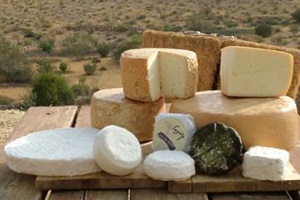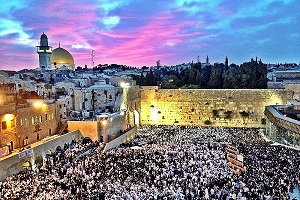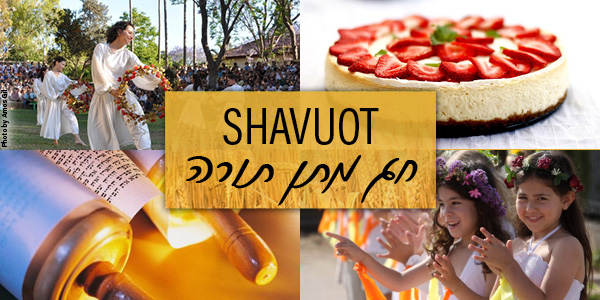Milk And Honey: A Celebration of Israel on Shavuot
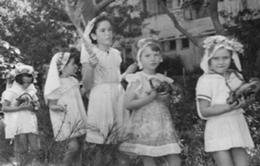
Shavuot. The Festival of Weeks. There are many traditions associated with this holiday - ranging from harvest festivals, singing and dancing, crowns of flowers, and of course as many dairy recipes as possible.
Religion, history, culture, and ethnic cuisine are united on this special holiday as we celebrate our connection to the Land of Milk and Honey.
In ancient times, Shavuot was an agricultural holiday, as, celebrating the the end of the grain harvest as Chag HaKatzir and Chag HaBikkurim (first fruits) of the season that were brought to the Temple in Jerusalem, the seven species with which the Land of Israel is blessed - wheat, barley, grapes, figs, pomegranates, olives and dates.
Essentially, Shavuot helped to reinstate the agricultural focus on the land while emphasizing the return to our ancient homeland where this mitzvah could again be fulfilled (albeit sans the Temple in Jerusalem).
The gleaning of the harvest is linked with so many aspect of Jewish history - from the laws of shmitta (7 year cycle of the Land), to the story of Ruth, to the renewal of agricultural settlement in the Land of Israel by the kibbutz and moshav cooperatives.
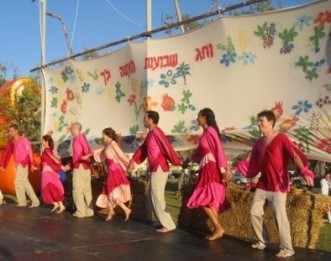
The rich and colorful traditions commemorating the the first fruits of the season now dominate the Israeli celebrations of Shavuot. Children take part in parades and festivals that remind us of the humble beginnings of rebuilding Israel - when Jews came from all over the world and dug their hands into the soil, helping to make the desert bloom.
Understandably, there is a divide between how Shavuot is celebrated within the Land of Israel from how it is celebrated outside of it. My first encounter with the Israeli-style celebrations was with my son in gan, as I was introduced to the many customs that make this holiday filled with fun, community, and appreciation of the land. Prior to that, I had always thought of Shavuot as the birthday of the Ten Commandments (this year, turning 3325 years old!)
Shavuot came to be associated with the giving of the Torah based on the counting of days from Passover (known as the Omer). In a "deja vu experience for the soul," we listen to the reading of the Ten Commandments on the anniversary that it was given to our ancestors at Mount Sinai.
On this day, the Children of Israel are transformed into a living, breathing nation, on their journey to the one land they will forever be able to call home.
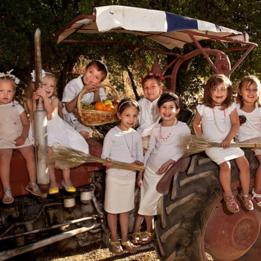
This adaptation of ancient tradition allowed Jews around the world to retain the significance of this pilgrimage holiday when we couldn't all reach the Land of Israel. Rather, we incorporated into our celebrations a recognition of the freedom, obligations and unity bestowed upon us as a Nation.
On occasion, Shavuot coincides with the historical date of the Declaration of Israel's Independence. When it does, it gives us a chance to reflect on how the two are connected.
It is to this land that Jews would come together as one: This is where the Jewish people would prosper as they work together to build a society that embodies the many influences of experience and identity borne from life in the Diaspora.
Wherever we are in the world, whichever interpretation we each embrace, Shavuot gives us an abundance of opportunity to appreciate the land from which our people have come and to which we have returned.
We wish everyone a joyous holiday filled with the sweetness of Israel!
Did You Know...
There are many interpretations as to the use of dairy on Shavuot. Some people claim that it is derived from the numerical value of the Hebrew letters in the word chalav, meaning milk, which equals 40 and since Moses spent 40 days on Mount Sinai, we eat foods with milk.
Another take on why dairy is so central to Shavuot is derived from the Song of Songs, Chapter 4, which reads: "honey and milk are under thy tongue." This is implied as a reference to the fact that the Torah is as nourishing as milk and as sweet as honey. And since it is believed we received the Torah on this day, we celebrate with an abundance of sweet cheesy goodies to keep us up for our late night learning sessions!
- It is also believed that King David was born and died on this day
- Samaritans in Israel mark Shavuot with a traditional pilgrimage ceremony atop Mount Gerizim
- Ultra-Orthodox Jews harvest wheat ahead of Shavuot, at the Mevo Horon settlement
Recommended for you:
What are You Doing for Shavuot?
Celebrate with Israel Forever!
About the Author



